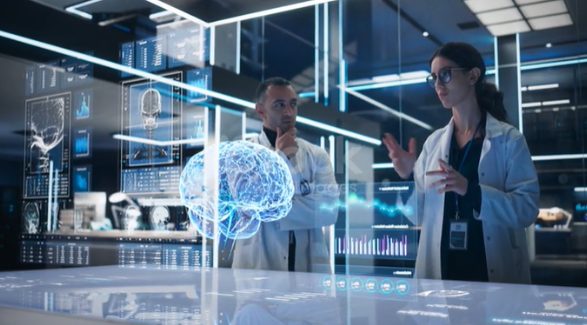
@ShahidNShah


Healthcare has always been at the cutting edge of innovation, constantly seeking ways to improve patient outcomes while managing rising costs. In recent years, machine learning (ML) has emerged as a game-changer in this field, offering solutions that were once confined to science fiction.
But what exactly does machine learning bring to the healthcare table, and what challenges must be addressed before its full potential can be realized? Let’s explore.
At its core, machine learning involves algorithms that learn from data, identify patterns, and make decisions with minimal human intervention. Specifically, in healthcare, this technology is making waves across multiple fronts.
Consider diagnosis, for instance. It’s traditionally dependent on a physician’s expertise and experience. But machine learning algorithms can now analyze thousands of medical images in minutes, detecting subtle anomalies that might escape even the most sharp-eyed specialist.
Take Google’s ML algorithm, which identifies cancerous tumors in mammograms with remarkable accuracy, or Stanford University researchers using deep learning to spot skin cancer in its early stages.
Disease prediction represents another promising frontier. By analyzing patient data, including lifestyle factors, genetic predispositions, and medical history, ML systems can forecast the probability of developing certain conditions before symptoms appear. This shift from reactive to proactive medicine could revolutionize preventive care.
Johns Hopkins University researchers have developed algorithms that predict sepsis onset hours before traditional clinical methods can detect it, potentially saving countless lives through early intervention.
Similarly, the Mayo Clinic has implemented ML systems that identify patients at risk for cardiac complications, allowing for preemptive measures.
One size does not fit all in healthcare. The human body is complex, and individual responses to treatments vary widely.
Machine learning excels at handling this complexity by analyzing individual patient data to recommend personalized treatment plans.
In oncology, for instance, ML algorithms analyze tumor genetic profiles to predict which treatment combinations will be most effective for specific patients. MD Anderson Cancer Center has developed a deep learning algorithm that predicts acute toxicities in patients receiving radiation therapy for head and neck cancers, allowing for treatment adjustments before complications arise.
Pharmaceutical companies have also embraced ML to accelerate drug discovery processes. Rather than the traditional trial-and-error approach that could take decades, ML algorithms can rapidly screen potential drug candidates, predict their effectiveness, and identify possible side effects. This not only speeds up the development pipeline but also reduces costs – a win-win for both industry and patients.
Beyond clinical applications, machine learning offers significant advantages in healthcare operations.
Administrative tasks like scheduling appointments, processing insurance claims, and managing medical records consume substantial resources. ML automation of these functions can redirect time and money toward patient care.
Harvard Pilgrim Health, a leading healthcare organization, uses ML-based fraud detection systems to identify suspicious insurance claims, saving millions of dollars annually. Machine learning algorithms can also predict patient admissions, helping hospitals optimize staffing levels and resource allocation.
Additionally, ML-powered chatbots and virtual assistants are transforming patient engagement by providing accurate medical information and medication reminders while answering patient queries. This technology not only improves patient satisfaction but also enhances treatment adherence.
Despite its tremendous potential, machine learning in healthcare faces several significant hurdles.
Data quality stands as perhaps the most pressing challenge. ML models are only as good as the data they’re trained on.
Medical data often exists in varying formats across different systems, and many electronic health records contain unstructured information like physician notes that are difficult to analyze.
Privacy concerns also loom large. Healthcare data is highly sensitive, and its use must comply with regulations like HIPAA in the United States. Striking the right balance between data accessibility for ML development and patient privacy protection requires careful navigation.
Then there’s the issue of trust. Healthcare professionals may hesitate to rely on ML recommendations without understanding how the algorithms reached their conclusions. “Black box” models that can’t explain their reasoning pose particular challenges in healthcare, where understanding the “why” behind a decision can be as important as the decision itself.
Healthcare provider adoption presents another hurdle. Many healthcare organizations operate on thin margins and may struggle to invest in ML infrastructure and talent. Integrating ML solutions into existing clinical workflows requires not just technological adjustments but also cultural shifts.

Image Source: iStock
For machine learning to fulfill its promise in healthcare, several key steps must be taken. First, standardizing medical data formats would significantly improve ML model training. Initiatives like Fast Healthcare Interoperability Resources (FHIR) are working toward this goal, but broader adoption is needed.
Developing “explainable AI” is also crucial. Healthcare ML should provide not just recommendations but clear rationales that healthcare providers can understand and evaluate. This transparency builds trust and supports informed decision-making.
Educational programs for healthcare professionals on ML capabilities and limitations will help bridge the knowledge gap. When providers understand how these tools can complement their expertise rather than replace it, adoption barriers lower.
Regulatory frameworks must evolve, too. The FDA has begun developing guidelines for AI/ML-based medical devices, but ongoing refinement is necessary to balance innovation with patient safety.
Perhaps most importantly, we must remember that machine learning should enhance human capabilities in healthcare, not replace them.
The practice of medicine is as much art as science, requiring empathy, intuition, and ethical judgment that remain beyond algorithmic reach.
ML excels at analyzing vast data sets and identifying patterns, but the human touch remains irreplaceable in patient care. The most successful healthcare applications of machine learning will be those that support and augment healthcare professionals, allowing them to focus more on the uniquely human aspects of medicine.
The fusion of machine learning and healthcare has only just begun. As algorithms become more sophisticated and healthcare data more accessible, we can expect further breakthroughs in predictive medicine, treatment personalization, and operational efficiency. For healthcare professionals, including those studying in nurse practitioner school online, understanding these emerging technologies will be essential for providing cutting-edge care.
All things considered, in this evolving landscape, the question isn’t whether machine learning has a place in healthcare but rather how to harness its capabilities most effectively while preserving the human-centered nature of medicine.
After all, the best healthcare has always been about putting the right tools in the hands of dedicated professionals. Machine learning represents the latest – but certainly not the last – in a long line of innovations aimed at that goal.

Chief Editor - Medigy & HealthcareGuys.
Aged care is facing a shift. More older adults are living longer with a mix of health and daily needs that require a fresh approach. Traditional care models often miss the mark when providing full …
Posted Jun 17, 2025 Care Management Elderly
Connecting innovation decision makers to authoritative information, institutions, people and insights.
Medigy accurately delivers healthcare and technology information, news and insight from around the world.
Medigy surfaces the world's best crowdsourced health tech offerings with social interactions and peer reviews.
© 2026 Netspective Foundation, Inc. All Rights Reserved.
Built on Mar 3, 2026 at 1:11pm